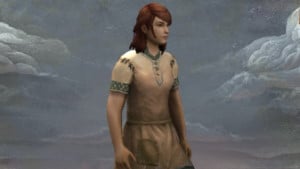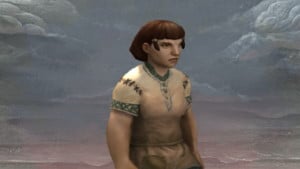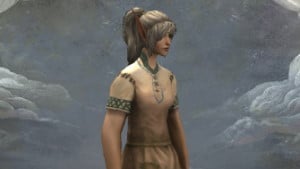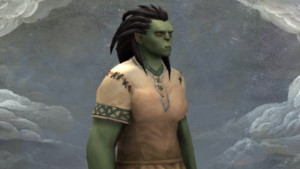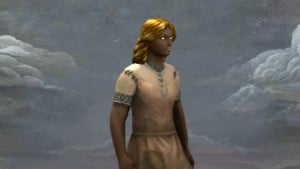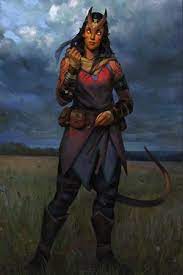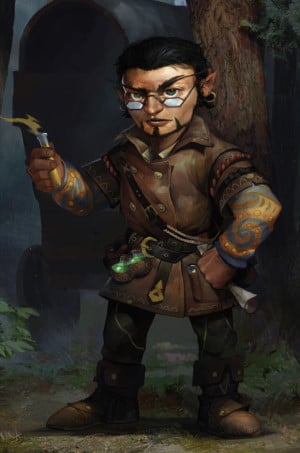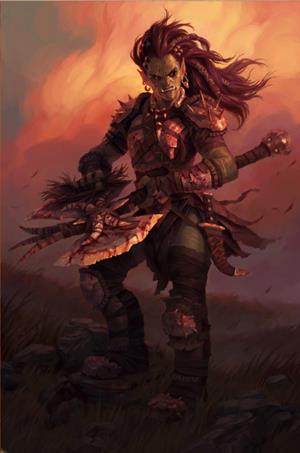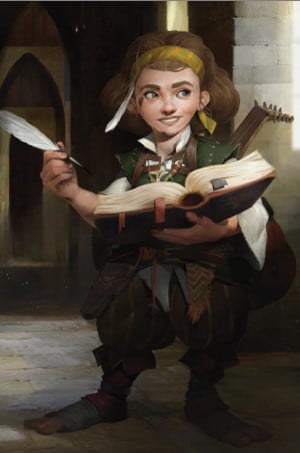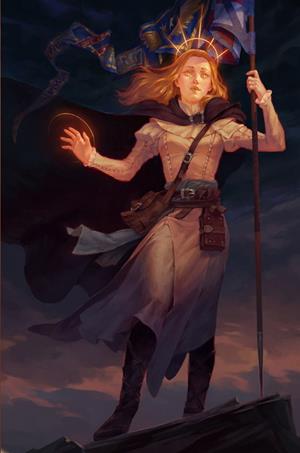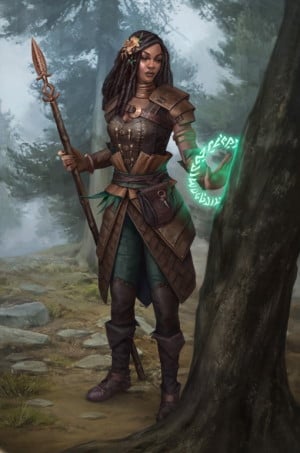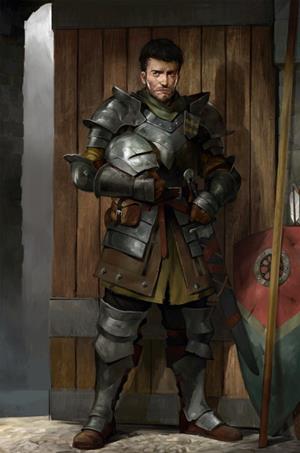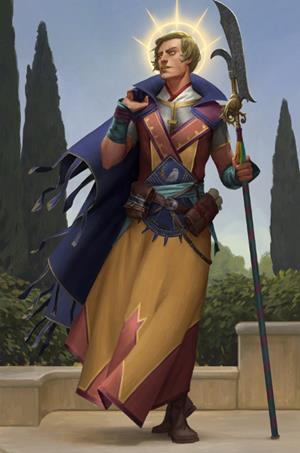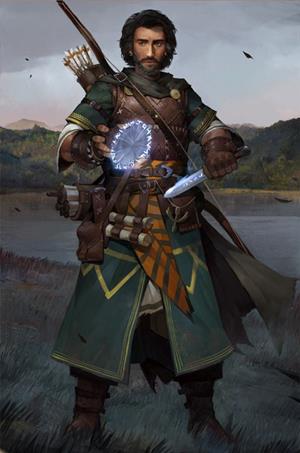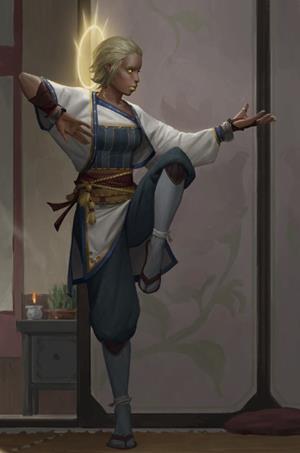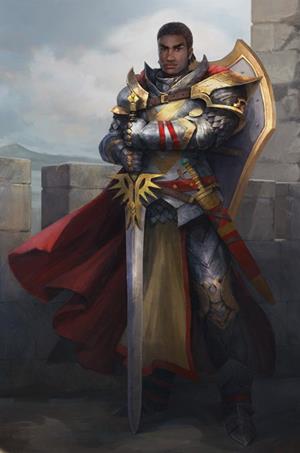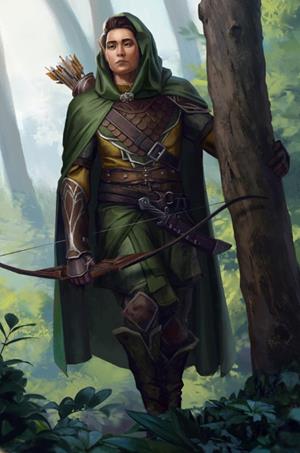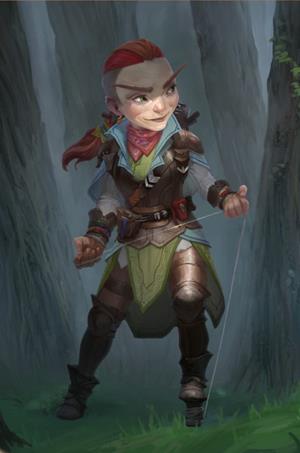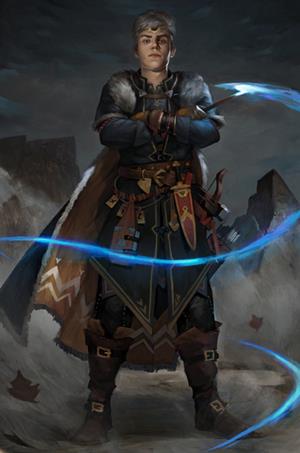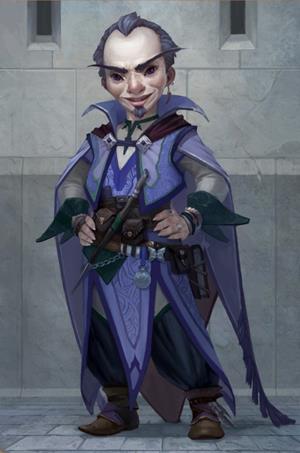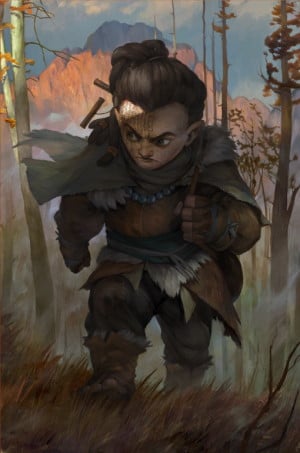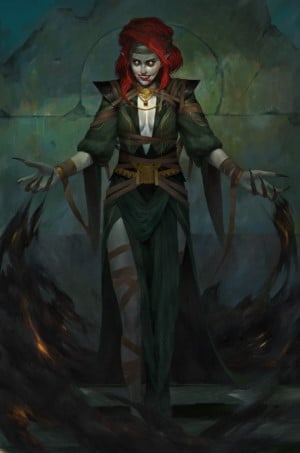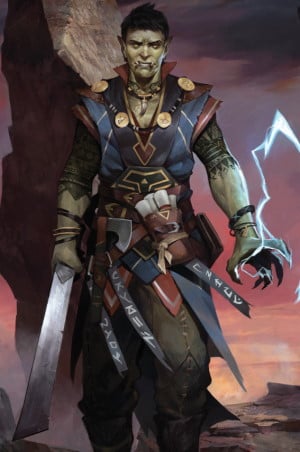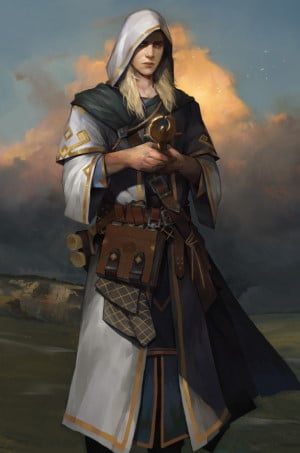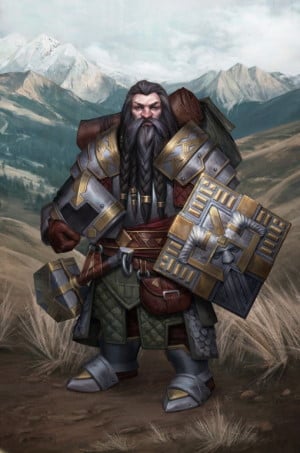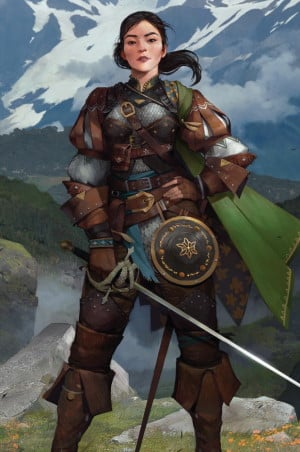Character Creation information of Pathfinder: Kingmaker will be covered on this page.
Character Creation
Races in Pathfinder: Kingmaker, there are eight playable character races in Pathfinder: Kingmaker. A ninth race, Tiefling, is available through DLC.
Races
Classes in Pathfinder: Kingmaker is a factor that determines your character's abilities, attributes and how they will develop as they increase in level. In Pathfinder: Kingmaker, each class will have some archetypes, serve as the sub-class. Some of the classes have certain requirements, you can only choose them after you reached a certain level.
Prestige Classes are a sort of advanced class that requires the character reach level 5 before taking prestige class levels and each have their own prerequisites.
Basic Class
Alchemists use alchemy to create explosive artifacts that can be used in battle and mutagen, a brew that can be used to enhance physical abilities.
Barbarians excel in close quarter combat. They have high health and damage reduction and have a unique ability called rage that boosts their physical abilities.
Bards can use abilities that boosts his and ally's abilities in a range. They are fit for any role but work best as supports.
Clerics excel at using healing magic and divine power. Their magic abilities work best against undead enemies.
Druids can use spells that are related to nature. They also have an animal companion that aids them in battle.
Fighters excel in close quarter combat. They can use a wide array of weapons and armor.
Inquisitors can use magic to buff themselves to fight specific enemies. They can also acquire teamwork feats that buffs companions.
Magus combines both magic and weapons while in combat. They use spells with focus on enhancing weapons and armor.
Monks can use their fists as weapons providing with strong unarmed attacks. They are not proficient with armors and use Wisdom as a bonus to AC.
Paladins can both participate in battle and aid companions by healing them. They focus on spells that are effective against evil.
Rangers can use both melee and ranged weapons. They cane specialize on a specific type of enemy providing with additional damage against it.
Rouges excel in stealth and provide with trap detection and pickling abilities. They are also agile providing with good evasion and better roll saves.
Sorcerers use spells in battle. These spells are learned when leveling up and don't need to be prepared, allowing for frequent use. They can also choose a bloodline granting additional power to their spells.
Wizards use spells in battle. They can learn any numbers of spells, but they need to prepare them in order to be used in battle. Wizards can also specialize in one school of magic, gaining additional spells and powers based on that school
Prestige Classes
Arcane Tricksters use both magic and rouge abilities. They can perform sneak attacks regardless of the enemy awareness and become invisible using magic.
Dragon Disciples use magic and dragon powers in battle. They receive additional ability scores and can transform into a dragon.
Eldritch Knights fight in close quarter combat or can use magic abilities from a distance. They can be very versatile adjusting to any situation.
Mystic Theurges can perform magic to aid allies or harm enemies. They have a special ability that allows casting two spells at once.
Stalwart Defenders focus on defensive abilities. They sacrifice damage and mobility while gaining damage reduction and better save throws.
Duelists focus on close quarter combat and dodging. They sacrifice armor capabilities to gain additional dodge chance and damage for critical strikes.
Stats information for Pathfinder: Kingmaker. Explanation on general mechanics and different Stats information can be found in this page.
General mechanics:
Dice roll
Dice rolls decide the outcome of every action in the game like damage, dodge chance, save throws, pick locking, trap detection, etc. The in-game system rolls the dice for you and calculate the outcome. You can check the rolls inside the combat information panel.
Dice rolls are expressed in three different parts: the number of dices that are being rolled, the number of sides of the dice and the added or subtracted bonus. For example if you are attacking with a weapon you can roll for 2d4+1. The 2 indicates the number of dices that are being rolled, the d4 indicates the number of sides the dice has and the +1 indicates the number that will be added to the number the dice rolls. So in this example you will roll 2 dices of 4 sides each, sum the result and then add 1.
Some other examples:
1d6 = You roll 1 dice that has 6 sides. There is no + or - so you won't add or substrate any number from the result.
1d8+4 = You will roll 1 dice with 8 sides and add 4 to the result.
2d6-2 = You will roll 2 dices with 6 sides and sum them up. Then you will substrate 2 from the result.
Understanding this mechanics is very important as it can help you choose from different possibilities. For example: if you have a weapon that deals 3d6 damage, we can calculate that it can deal between 3 and 18 damage (provided three one or three six). On the other hand we have a weapon that deals 2d10 damage, so we can calculate that it deals from 2 to 20 damage. From here, we can decide if we prefer to have a higher minimum damage or a higher maximum damage.
Hit Die:
This determines the number of faces of the dice that will be rolled when leveling up to determine health points (HP) gained.
| d4 | Sorcerer, Wizard |
| d6 | Bard, Rogue |
| d8 | Cleric, Druid, Monk, Ranger |
| d10 | Fighter, Paladin |
| d12 | Barbarian |
Skill Checks:
To make a skill check, roll a d20 and add your character’s skill modifier. Skill checks are rolled against a Difficulty Class (DC) that needs to be overcome in order to successfully pass the skill check. This can be triggered by a player action (trying to pick a lock) or passively rolled (detecting a secret door in a room).
Attack Roll:
When attacking an opponent, roll a d20 and add your character’s attack bonus. If the result equals or exceeds the opponent’s Armor Class (AC), the attack succeeds. On a successful attack, you roll the dice indicated for the weapon you used to determine how much damage your attack deals. Damage reduces hit points (hp).
On an attack roll, a bonus is applied from the appropriate column on the table according to the class to which the character belongs. Whether a character uses the first (good) base attack bonus, the second (average) base attack bonus, or the third (poor) base attack bonus depends on the class. Barbarians, fighters, paladins, and rangers have a good base attack bonus, so they use the first Base Attack Bonus column. Clerics, druids, monks, and rogues have an average base attack bonus, so they use the second column. Sorcerers and wizards have a poor base attack bonus, so they use the third column. Numbers after a slash indicate additional attacks at reduced bonuses: “+7/+2” represents two attacks per round, with an attack bonus of +7 for the first attack, and +2 for the second.
Any modifiers on attack rolls apply to all these attacks normally, but bonuses do not grant extra attacks. If a character has more than one class, the base attack bonuses for each class are cumulative.
| Class Level | Base Attack Bonus (Good) | Base Attack Bonus (Average) | Base Attack Bonus (Poor) |
| 1st | +1 | +0 | +0 |
| 2nd | +2 | +1 | +1 |
| 3rd | +3 | +2 | +1 |
| 4th | +4 | +3 | +2 |
| 5th | +5 | +3 | +2 |
| 6th | +6/+1 | +4 | +3 |
| 7th | +7/+2 | +5 | +3 |
| 8th | +8/+3 | +6/+1 | +4 |
| 9th | +9/+4 | +6/+1 | +4 |
| 10th | +10/+5 | +7/+2 | +5 |
| 11th | +11/+6/+1 | +8/+3 | +5 |
| 12th | +12/+7/+2 | +9/+4 | +6/+1 |
| 13th | +13/+8/+3 | +9/+4 | +6/+1 |
| 14th | +14/+9/+4 | +10/+5 | +7/+2 |
| 15th | +15/+10/+5 | +11/+6/+1 | +7/+2 |
| 16th | +16/+11/+6/+1 | +12/+7/+2 | +8/+3 |
| 17th | +17/+12/+7/+2 | +12/+7/+2 | +8/+3 |
| 18th | +18/+13/+8/+3 | +13/+8/+3 | +9/+4 |
| 19th | +19/+14/+9/+4 | +14/+9/+4 | +9/+4 |
| 20th | +20/+15/+10/+5 | +15/+10/+5 | +10/+5 |
Base Save Bonus:
There are Fortitude, Reflex and Will save throws. Whether a character uses the first (good) bonus or the second (poor) bonus depends on his or her class and the type of saving throw being attempted. For example, fighters get the lower bonus on Reflex and Will saves and the higher bonus on Fortitude saves, while rogues get the lower bonus on Fortitude and Will saves and the higher bonus on Reflex saves. Monks are equally good at all three types of saving throws. See each class’s description to find out which bonus applies to which category of saves. If a character has more than one class, the base save bonuses for each class are cumulative.
| Class Level | Base Save Bonus (Good) | Base Save bonus (Poor) |
| 1st | +2 | +0 |
| 2nd | +3 | +0 |
| 3rd | +3 | +1 |
| 4th | +4 | +1 |
| 5th | +4 | +1 |
| 6th | +5 | +2 |
| 7th | +5 | +2 |
| 8th | +6 | +2 |
| 9th | +6 | +3 |
| 10th | +7 | +3 |
| 11th | +7 | +3 |
| 12th | +8 | +4 |
| 13th | +8 | +4 |
| 14th | +9 | +4 |
| 15th | +9 | +5 |
| 16th | +10 | +5 |
| 17th | +10 | +5 |
| 18th | +11 | +6 |
| 19th | +11 | +6 |
| 20th | +12 | +6 |
Attributes
A character's attributes are the six primary statistics defining his or her nature, and are determined during character creation.
Each attribute represents a particular aspect of the character, and has a significant impact on his or her capabilities in combat and during interactions. Attributes can be seen as the character's inherent abilities, in contrast with Skills which indicate how well a character has learned to perform a specific action. Unlike skills, attributes cannot be permanently improved after character creation, although certain wearable and consumable items can provide temporary bonuses.

Strength
Strength measures muscle and physical power. This ability is important for those who engage in hand-to-hand (or “melee”) combat, such as fighters and some rangers. Strength also sets the maximum amount of weight your character can carry.
A character with a Strength score of 0 is too weak to move in any way and is unconscious. Some creatures (such as incorporeal creatures) do not possess a Strength score and have no modifier at all to Strength-based skills or checks.

Dexterity
Dexterity measures agility, reflexes, and balance. This ability is the most important one for rogues, but it's also useful for characters who wear light or medium armor or no armor at all. This ability is vital for characters seeking to excel with ranged weapons, such as the bow or sling.
A character with a Dexterity score of 0 is incapable of moving and is effectively immobile (but not unconscious).

Constitution
Constitution represents your character's health and stamina. A Constitution bonus increases a character's hit points, so the ability is important for all classes. Some creatures, such as undead and constructs, do not have a Constitution score. Their modifier is +0 for any Constitution-based checks. A character with a Constitution score of 0 is dead.

Intelligence
Intelligence determines how well your character learns and reasons. This ability is important for wizards because it affects their spellcasting ability in many ways.
A character with an Intelligence score of 0 is comatose. Some creatures do not possess an Intelligence score. Their modifier is +0 for any Intelligence-based skills or checks. Creatures of
animal-level instinct have Intelligence scores of 1 or 2. Any creature capable of understanding speech has a score of at least 3.

Wisdom
Wisdom describes a character's willpower, common sense, awareness, and intuition. Wisdom is the most important ability for clerics, and it is also important for rangers. If you want your character to have acute senses, put a high score in Wisdom.
Every creature has a Wisdom score. A character with a Wisdom score of 0 is incapable of rational thought and is unconscious.

Charisma
Charisma measures a character's personality, personal magnetism, ability to lead, and appearance. It is the most important ability for bards. It is also important for clerics, since it affects their ability to channel energy. For undead creatures, Charisma is a measure of their unnatural “lifeforce.” Every creature has a Charisma score. A character with a Charisma score of 0 is not able to exert himself in any way and is unconscious.
Stats
Armor Class (AC)
Your Armor Class (AC) represents how hard it is for opponents to land a solid, damaging blow on you. It's the attack roll result that an opponent needs to achieve to hit you.
Your AC is equal to the following:
10 + armor bonus + shield bonus + Dexterity modifier + other modifiers
Note that armor limits your Dexterity bonus, so if you're wearing armor, you might not be able to apply your whole Dexterity bonus to your AC (see Table: Armor and Shields).
Touch AC
Some attacks completely disregard armor, including shields and natural armor—the aggressor need only touch a foe for such an attack to take full effect. In these cases, the attacker makes a touch attack roll (either ranged or melee). When you are the target of a touch attack, your AC doesn't include any armor bonus, shield bonus, or natural armor bonus. All other modifiers, such as your size modifier, Dexterity modifier, and deflection bonus (if any) apply normally. Some creatures have the ability to make incorporeal touch attacks. These attacks bypass solid objects, such as armor and shields, by passing through them. Incorporeal touch attacks work similarly to normal touch attacks except that they also ignore cover bonuses. Incorporeal touch attacks do not ignore armor bonuses granted by force effects, such as mage armor and bracers of armor.
Flat Footed AC
Sometimes you can't use your Dexterity bonus (if you have one). If you can't react to a blow, you can't use your Dexterity bonus to AC. If you don't have a Dexterity bonus, your AC does not change.
Base Attack Bonus (BAB)
Each creature has a base attack bonus and it represents its skill in combat. As a character gains levels or Hit Dice, his base attack bonus improves. When a creature's base attack bonus reaches +6, +11, or +16, he receives an additional attack in combat when he takes a full-attack action (which is one type of full-round action—see Combat).
Caster Level
A spell's power often depends on its caster level, which for most spellcasting characters is equal to her class level in the class she's using to cast the spell.
In the event that a class feature or other special ability provides an adjustment to your caster level, that adjustment applies not only to effects based on caster level (such as range, duration, and damage dealt), but also to your caster level check to overcome your target's spell resistance and to the caster level used in dispel checks (both the dispel check and the DC of the check).
Combat Maneuver Bonus
Each character and creature has a Combat Maneuver Bonus (or CMB) that represents its skill at performing combat maneuvers (see more in chapter “How Combat Works”). A creature's CMB is determined using the following formula:
CMB = Base attack bonus + Strength modifier + special size modifier
Creatures that are size Tiny or smaller use their Dexterity modifier in place of their Strength modifier to determine their CMB. The special size modifier for a creature's Combat Maneuver Bonus is as follows:
- Fine –8
- Diminutive –4
- Tiny –2
- Small –1
- Medium +0
- Large +1
- Huge +2
- Gargantuan +4
- Colossal +8
Some feats and abilities grant a bonus to your CMB when performing specific maneuvers.
Concentration
To cast a spell, you must concentrate. If something interrupts your concentration while you're casting, you must make a concentration check or lose the spell. When you make a concentration check, you roll d20 and add your caster level and the ability score modifier used to determine bonus spells of the same type. Clerics, druids, and rangers add their Wisdom modifier. Bards, paladins, and sorcerers add their Charisma modifier. Finally, wizards add their Intelligence modifier. The more distracting the interruption and the higher the level of the spell you are trying to cast, the higher the DC. If you fail the check, you lose the spell just as if you had cast it to no effect.
Damage Reduction (DR)
Some magic creatures have the supernatural ability to instantly heal damage from weapons or ignore blows altogether as though they were invulnerable. Sometimes damage reduction represents instant healing. Sometimes it represents the creature's tough hide or body. In either case, other characters can see that conventional attacks won't work.
The numerical part of a creature's damage reduction (or DR) is the amount of damage the creature ignores from normal attacks. Usually, a certain type of weapon can overcome this reduction (see Overcoming DR). This information is separated from the damage reduction number by a slash. For example, DR 5/magic means that a creature takes 5 less points of
damage from all weapons that are not magic. If a dash follows the slash, then the damage reduction is effective against any attack that does not ignore damage reduction.
Whenever damage reduction completely negates the damage from an attack, it also negates most special effects that accompany the attack, such as injury poison, a monk's stunning, and injury-based disease. Damage Reduction does not negate touch attacks, energy damage dealt along with an attack, or energy drains. Nor does it affect poisons or diseases delivered by inhalation, ingestion, or contact. Attacks that deal no damage because of the target's damage reduction do not disrupt spells.
Spells, spell-like abilities, and energy attacks (even non-magical fire) ignore damage reduction. If a creature has damage reduction from more than one source, the two forms of damage reduction do not stack. Instead, the creature gets the benefit of the best damage reduction in a given situation.
Fortitude
Fortitude saves measure your ability to stand up to physical punishment or attacks against your vitality and health.
Generally, when you are subject to an unusual or magical attack, you get a saving throw to avoid or reduce the effect. Like an attack roll, a saving throw is a d20 roll plus a bonus based on your class and level, and an associated ability score. Apply your Constitution modifier to your Fortitude saving throws.
Reflex
Reflex saves test your ability to dodge area attacks and unexpected situations.
Generally, when you are subject to an unusual or magical attack, you get a saving throw to avoid or reduce the effect. Like an attack roll, a saving throw is a d20 roll plus a bonus based on your class and level, and an associated ability score. Apply your Dexterity modifier to your Reflex saving throws.
Will
Will saves reflect your resistance to mental influence as well as many magical effects.
Generally, when you are subject to an unusual or magical attack, you get a saving throw to avoid or reduce the effect. Like an attack roll, a saving throw is a d20 roll plus a bonus based on your class and level, and an associated ability score. Apply your Wisdom modifier to your Will saving throws.
Skills
Skills in Pathfinder: Kingmaker are covered on this page.
Skills represent your character's ability to accomplish tasks not (directly) related to murdering living, breathing things with extreme prejudice (but, for example, convincing them to do the same to one another). Skills listed here are Consolidated Skills, where core Pathfinder skills are aggregated into skill groups, to increase the utility and flexibility.
The amount of skills a character gets per level is based on the class and then gains 1/2 of the Intelligence modifier. For example an int of 12 (a +1 bonus) would grant 1 skill rank at 1st and 3rd level but not 2nd or 4th level and so on. an int of 14(a +2 bonus) however would grant 1 skill rank every level.
Skills
Physique
This skill represents character's talent at deeds of physical prowess such as leaping, scaling walls, and swimming.
Acrobatics
This skill represents character's talent for balance and coordination, including aerial maneuvers, gymnastics, and tumbling.

Stealth
This skill represents character's talent at avoiding detection, allowing the character to slip past foes or strike from an unseen position. This skill covers hiding and moving silently.

Knowledge (Arcana)
This skill represents character's knowledge about spells, magic items and numerous bits of magical lore.

Knowledge (World)
This skill represents character's knowledge about people, systems that make civilization run, historical events that made societies what they are today. Part of this expertise includes a greater understanding of languages and geography.

Lore (Nature)
This skill represents character's knowledge about the natural world, and ability to command and train wild creatures.

Lore (Religion)
This skill represents character's knowledge about the secrets of deities, holy lore, and extraplanar realms.

Perception
This skill represents character's acuity of your senses allows you to notice fine details, see danger coming, and tell when people are lying or otherwise behaving suspiciously.

Persuasion
This skill represents character's talent to manipulate other people through negotiation, deceit, or intimidation.

Use Magic Device
This skill represents character's talent at activating magic items, even if you are not otherwise trained in their use.

